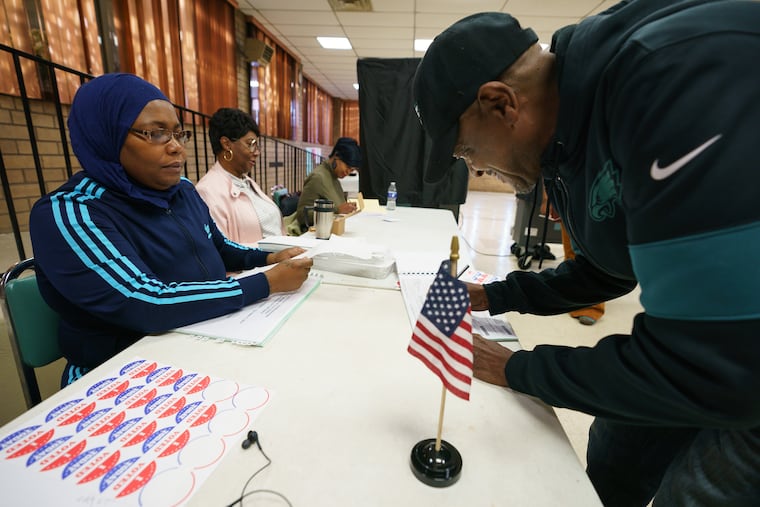2020 election votes are at stake as a Pennsylvania county plays a game of chicken with Gov. Tom Wolf
Pennsylvania Gov. Tom Wolf said he would decertify current voting machines. Now Dauphin County is all but daring him to do it, with the 2020 presidential election a year away.

Dauphin County, home of the Pennsylvania capital of Harrisburg, is starting a high-stakes game of chicken with the state. Republican county commissioners decided Wednesday not to buy new voting machines, defying an order from Gov. Tom Wolf, a Democrat, and all but daring him to take action against the county ahead of the 2020 election.
Dauphin has been one of several counties that have resisted buying new voting machines, with its elections director saying the electronic machines used for more than three decades remain secure and usable. The two Republican county commissioners agreed Wednesday not to buy machines. (A third commissioner, a Democrat, did not attend the meeting.)
Wolf said he ordered the statewide upgrade to make the voting machines more secure and tabulations verifiable.
What Dauphin County decided
“There’s an old saying: ‘If it’s not broken, don’t fix it,’” Commissioner Mike Pries told the Associated Press. “Our machines work, they’re fundamentally sound, we trust our machines, you cannot hack our machines.”
Jeff Haste, the other Republican commissioner, agreed, Fox43 reported, saying, “If I heard my colleague right, I think we’re telling the state, ‘Find a better solution.’”
Pries also cited problems in some other Pennsylvania counties that debuted their new machines in last week’s elections. Dauphin estimated it would have cost around $5 million to update its voting machines.
County officials did not return calls for comment Thursday.
Why it’s risky: The threat of votes getting thrown out
There’s a risk to flouting Wolf’s mandate.
When Wolf last year ordered all 67 counties to buy new voting machines in time for the 2020 elections, he paired it with a threat: All current voting systems will be decertified, meaning they cannot be used in future elections.
State officials have told counties they will decertify existing machines in early 2020, before the primary election in April.
“The Department of State has not reconsidered its decision that all counties must replace older voting systems with ones that produce a voter-verifiable paper trail and meet the newest standards of security and accessibility,” department spokesperson Wanda Murren said in a statement.
In a follow-up statement, Murren underscored the department’s threat: “The secretary has stated repeatedly throughout the last year and a half that all the old voting systems will be decertified before the April 2020 primary, and use of decertified systems is not permitted by law.”
If Dauphin County doesn’t buy new machines and the state follows through on its threat, votes cast there would not be counted, which elections officials there consider unthinkable, especially in a presidential year. Dauphin County has more than 184,000 registered voters.
Thus, the game of chicken. Which side will relent?
Why it’s risky: The election-security question
Murren noted that state funding will be available for the voting machine replacement effort. In last week’s election, 45 counties debuted machines. Some of the remaining 22 counties have prepared to use new machines next year. So far, Dauphin is the only one to defy the governor.
The effort is meant to modernize Pennsylvania’s election infrastructure, which in many counties is decades old and for most voters did not create a paper record of their choices that could be manually audited or recounted. All new machines must leave a paper trail, per Wolf’s order, which experts widely agree is more secure.
Dauphin County’s machines create no paper trail. While county officials say the machines are secure, the lack of a paper record makes it impossible to audit the system for accuracy.
Why it’s risky: The timeline
If Dauphin County officials — the three commissioners were all reelected last week — change their minds, they won’t have much time to buy new systems.
It takes months to select one of the state-certified systems, purchase the machines, test them, and train election workers and teach the public about them. Philadelphia’s machines were selected in February and used for the first time last week; other counties have had similarly lengthy rollouts.
The presidential primary will take place April 28, 5½ months away.